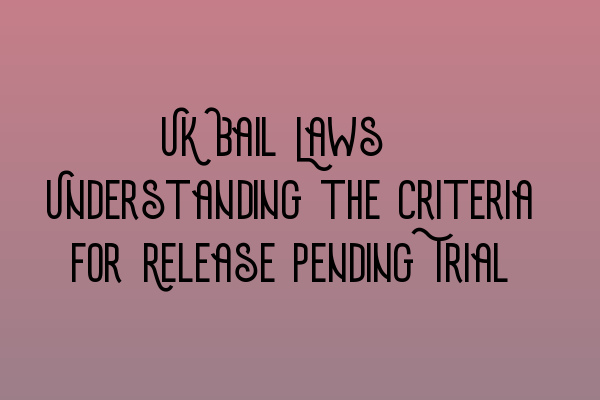UK Bail Laws: Understanding the Criteria for Release Pending Trial
When someone is accused of a crime in the UK, they may be held in custody until their trial unless they are granted bail. Bail is the temporary release of a defendant from custody pending their trial. It is an essential aspect of our criminal justice system, as it allows individuals to maintain their freedom and carry on with their daily lives while awaiting trial. In this article, we will delve into the criteria that UK bail laws consider when deciding whether an accused person should be released pending trial.
The Presumption of Bail
In the UK, there is a general presumption in favor of granting bail. However, this presumption can be rebutted if certain conditions exist. The court’s primary concern is the prevention of a defendant from absconding or committing further offenses while released on bail. Therefore, the decision to grant or deny bail is based on a careful analysis of various factors.
Factors Considered in Bail Decision
When considering whether to grant bail, the court will assess the following factors:
- Flight Risk: The court will assess the likelihood of the accused person failing to appear in court for trial if they are released on bail. Factors such as the seriousness of the charges, previous convictions, ties to the community, and employment status will be taken into account.
- Public Safety: The court will consider whether releasing the accused person would pose a danger to the public. If the court believes there is a substantial risk, bail may be denied or strict conditions may be imposed.
- Witness Interference: If there is a significant risk of tampering with witnesses or evidence, the court may refuse bail to protect the integrity of the trial process.
- Previous Criminal History: The accused person’s previous criminal history, including any previous breaches of bail conditions, will be considered by the court.
- Ties to the Community: The court will examine the accused person’s ties to the local community, such as family, employment, and residence. Strong ties increase the likelihood of bail being granted.
- Strength of Evidence: The court may consider the strength of the evidence against the accused person. If the evidence is weak or unreliable, it may influence the bail decision.
Types of Bail Conditions
When bail is granted, the court may impose certain conditions to ensure the defendant complies with the terms of their release. These conditions can include:
- Surrendering passports or travel documents: To prevent the accused person from leaving the country.
- Regular reporting to a police station: Where the accused person must sign in regularly.
- Curfews: Restricting the accused person’s movement during specific hours.
- Residence requirements: Requiring the accused person to live at a specified address while on bail.
- Non-contact orders: Restricting the accused person from contacting certain individuals involved in the case.
These conditions aim to strike a balance between the accused person’s right to liberty and the need to protect the community and the integrity of the criminal justice system.
Conclusion
Understanding the criteria for release on bail pending trial is crucial for both defendants and their legal representatives. The decision to grant or deny bail rests on the assessment of factors such as flight risk, public safety, witness interference, previous criminal history, ties to the community, and strength of evidence. Bail conditions may be imposed to ensure compliance. If you require further information about UK bail laws or any other aspect of criminal law, please contact us at SQE Criminal Law & Practice Law UK.
Related Articles:
SQE 1 Practice Exam Questions,
SQE 1 Practice Mocks FLK1 FLK2,
SQE 2 Preparation Courses,
SQE 1 Preparation Courses,
SRA SQE Exam Dates
